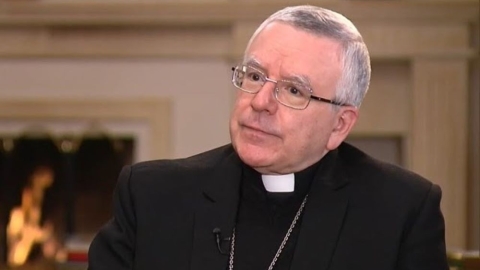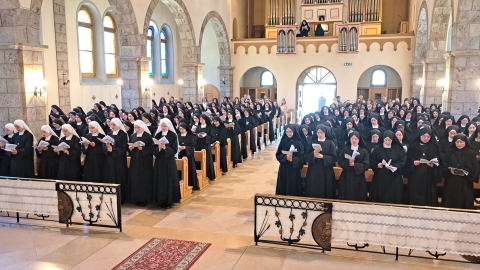The Revue Thomiste Severely Criticizes Fiducia Supplicans

La Revue Thomiste (The Thomist Review), published by the Institute of St. Thomas Aquinas of the Dominican Fathers in Toulouse, France, which was founded in 1893, is one of the most prestigious theological publications in the French language. It cannot be classified as reactionary or conservative. However, it has published, under the pen of its director, Fr. Emmanuel Perrier, OP, one of the strongest and most damning critiques of Fiducia supplicans (FS).
Critics are alarmed by the “disturbance of the Christian people” caused by FS, which makes them “lose confidence in the word of the universal pastor.” The author sees this as a reaction of the sensus fidei or attachment of the faithful to truths relating to faith and morals.
Blessing May Only Be Ordered to Salvation
The reference is to the Epistle to the Ephesians: “Blessed be the God and Father of our Lord Jesus Christ, who has blessed us with all spiritual blessings in heavenly places, in Christ. As He chose us in Him before the foundation of the world, that we should be holy and unspotted in His sight in charity” (Eph. 1:3-4). Every blessing therefore comes from God, and is given to sanctify.
Hence: “To deviate from this divine order of blessing for salvation is impossible for the Church. Any talk of blessing without this blessing being explicitly ordered to be ‘holy and unspotted,’ even for otherwise laudable motives, therefore immediately offends the sensus fidei.”
The Church Does Not Bless Outside the Liturgy
Fr. Perrier recalls that “blessing is an activity of the Church.” It is not the rite which determines that a blessing is “liturgical,” but the fact that it is given by the Church through a minister: “When the faithful approach a priest to ask for the blessing from the Church, and this priest blesses them in the name of the Church, he acts in the person of the Church.”
The author is not surprised "that the sensus fidei is disturbed when it is taught that a priest, required as a minister of Christ, could give a blessing without this blessing being a sacred action of the Church, simply because no ritual has been established.”
Related Article:
Every Blessing Has a Moral Object
The Dominican notes that blessing, on God's side, is a gift of His infinite mercy, with a view to salvation, through Jesus Christ. On the side of the beneficiary, it presupposes “faith and humility to recognize one’s imperfection before God.” As for the benefits, they are ordered according to their relationship to salvation.
However, notes the author, FS confuses the moral significance of blessings. In this way “while one highlights one condition of blessing to the detriment of others, e.g., God's mercy and His unconditional love for the sinner do not prevent the finality of this mercy and this unconditional love.”
Similarly if one “evokes the pleasant effects – comfort, tenderness – while hiding the unpleasant effects – conversion, rejection of sin, the fight against vices, the spiritual combat.” Or by speaking in general terms – charity, life – without considering the concrete consequences of the blessing.
Related Article:
God Does Not Bless Evil
Man is divided in the face of evil and can turn towards it. Now “God never blesses evil but always blesses in order to deliver from evil (one of the requests of the Our Father, cf. Mt. 6:13),” so that man may obtain forgiveness of his sins and turns away from evil.
This is why the faithful cannot help but see a type of racket in “blessing disorderly acts.” They are alarmed “blessing evil could be attributed to God.” In other words, they are upset to hear that “divine mercy blesses without delivering,” and that they themselves will be abandoned to their misery.
Related Article:
Magisterium: Innovation Implies Responsibility
Fr. Perrier recalls some notions about the Magisterium and notes that a text, “which has all the external forms of a Magisterium text, intends to teach a proposition qualified as a ‘specific and innovative contribution’ implying ‘a real development.’” He quotes FS no. 31:
“Within the horizon outlined here appears the possibility of blessings for couples in irregular situations and for couples of the same sex, the form of which should not be fixed ritually by ecclesial authorities to avoid producing confusion with the blessing proper to the Sacrament of Marriage.” He opposes the Responsum given by the same Dicastery on February 22, 2021:
“It is not licit to impart a blessing on relationships, or partnerships, even stable, that involve sexual activity outside of marriage (i.e., outside the indissoluble union of a man and a woman open in itself to the transmission of life), as is the case of unions between persons of the same sex. The presence in such relationships of positive elements. . . [is not sufficient] since the positive elements exist within the context of a union not ordered to the Creator’s plan.”
FS affirms that there is no contradiction, but the author points out that the Responsum targets the disordered acts of a couple, inseparable from this couple: “It is precisely because of what makes this couple a couple, that this blessing is impossible.”
Fr. Perrier concludes that there is an “incoherence” that causes great disturbance of the sensus fidei. First “because they introduce uncertainty as to the truths really taught by the Magisterium,” but also because they “shake confidence in the divine assistance of the Magisterium and the authority of the successor of Peter which belong to the sacred deposit of the word of God.”
Related Article:
Pastoral Care
The author believes that FS has placed “both the Magisterium and the pastors in an untenable situation, on three counts.” First “by maintaining that the blessings of irregular and same-sex couples are possible provided they have neither ritual nor liturgy,” thus promoting “pastoral care while refusing [to admit] that pastors are receiving directions” on its application. It is “the establishment of an ‘institutionalized concealment’ for a whole section of ecclesial activity.”
The second reason is that “the principle introduced by Fiducia supplicans knows no limits in itself.” The multiple circumstances of life will bring “situations which fall within this framework, from the most indecent to the most objectively scandalous, and which can nevertheless be blessed.” By making the practice uncontrollable, they accept in advance all the deviations that will occur.
By following “the principle at the heart of the document, it would become possible to bless any objective situation of sin as such or any situation objectively established by sin as such,” even “that most contrary to the Gospel and most abominable in the eyes of God. Everything could be blessed... as long as there is no ritual or liturgy.” This consequence had already been emphasized by FSSPX.News and by Cardinal Gerhard Müller.
Finally, “when superiors cast off their responsibility to inferiors, the inferiors find themselves carrying the entire burden alone.” Priests will have to, in each difficult case, “carry on their conscience the weight of the decision that they have been forced to make alone,” asking themselves whether they have been faithful servants or corrupters of the priesthood.
The conclusion of this article, which is only the first in a series, is uncompromising:
“Even going back several centuries, this document has no equivalent. Trouble for God's people has come and it cannot be undone. We must now work to repair the damage, so that its causes… are resolved before the conflict spreads.”
(Sources : La Croix/revuethomiste.fr – FSSPX.Actualités)





